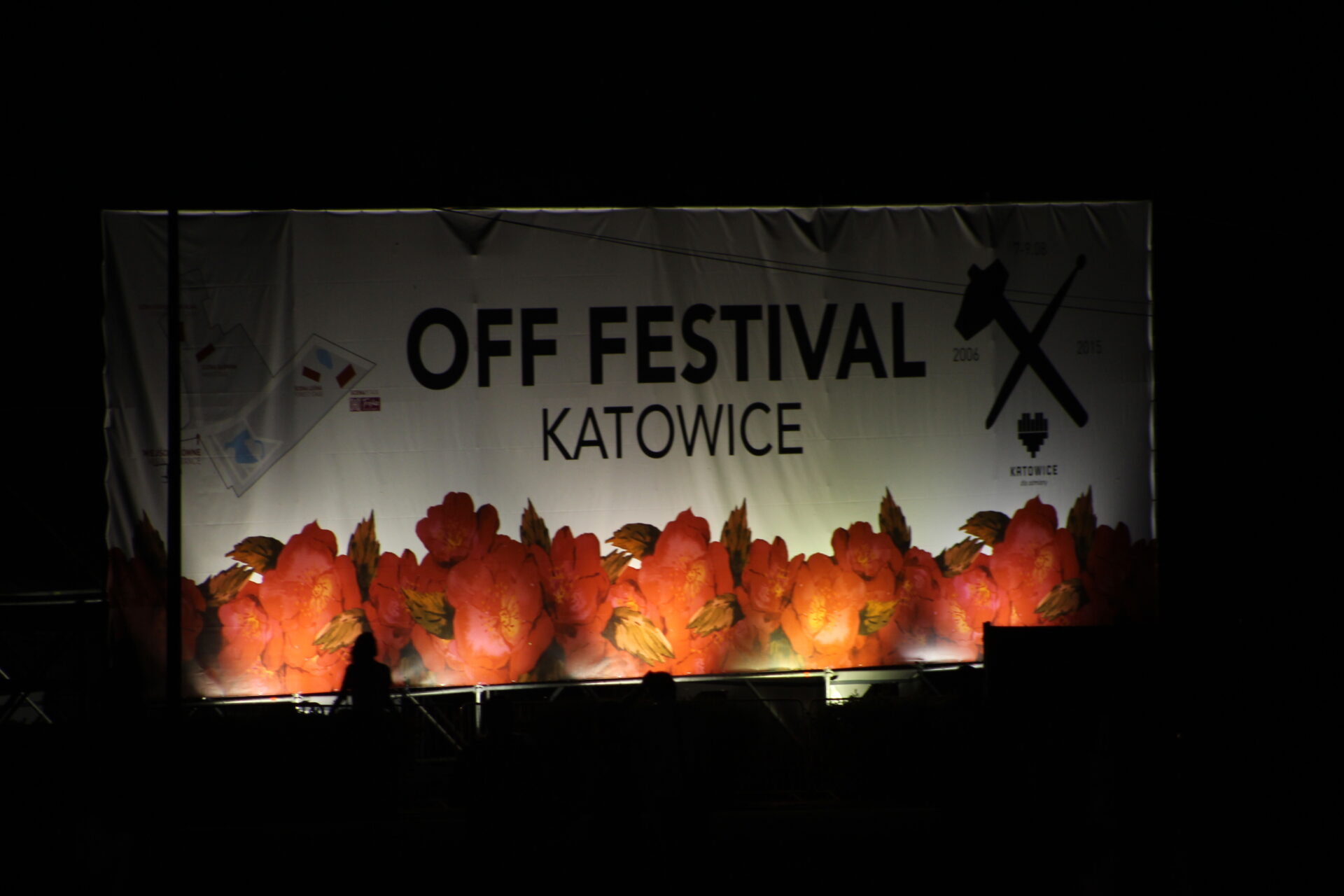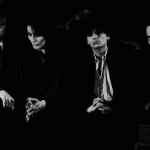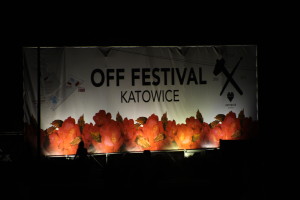 Katowice, in the heart of the Upper Silesian Industrial District of south-west Poland and a product of 19th-century industrial boom, is one of the more unlikely places to hold a music festival. However, just as the city itself is expanding into a centre of science, culture, industry, business, trade and transportation so the OFF Festival, now celebrating its 10th year, is quietly growing into one of the major stop-offs for music lovers throughout the world.
Katowice, in the heart of the Upper Silesian Industrial District of south-west Poland and a product of 19th-century industrial boom, is one of the more unlikely places to hold a music festival. However, just as the city itself is expanding into a centre of science, culture, industry, business, trade and transportation so the OFF Festival, now celebrating its 10th year, is quietly growing into one of the major stop-offs for music lovers throughout the world.
Curated by art director Artur Rojek, (former frontman of Polish band Myslovitz) OFF doesn’t promise any radio-friendly hits or the obvious names and faces. Instead “what shapes and holds the festival’s philosophy together is its openness to everything that doesn’t come out of a cookie-cutter, everything that’s less obvious and more challenging than the products served up in the mainstream.”
The first thing that struck me (aside from the 35 degrees plus heat) is the laid-back, gentle atmosphere in Dolina Trzech Stawow (Three Ponds Valley), an unusual park within the city unfolded between two housing estates and in the flight-path of the occasional low-flying light aircraft.
The concert arenas are separated from the hospitality tents, tightly guarded by grim-faced security guards who take the opportunity to pat-a-cake your bag as you walk from stage to beer tent and back again. However, this means that watching the bands is an altogether thoroughly pleasant experience, as there are no lobbed bottles of unidentified liquids nor too many folks dazed and confused and strewn out on the grass in front of the bass speakers having had one Grolsch too many in the early afternoon sun.
Unlike other festivals, it’s not possible to scan the programme and highlight which bands you’re in favour of seeing; there are numerous lesser-known marquee names, fewer apparently obvious musical styles and the odd difficult to define genre. The beauty of OFF is that it allows you to throw away any preconceived notions, discard any prejudice and simply permit yourself to be drawn into whatever sound floats into the air at any given time. As such, I found myself drawn to Mathcore, Death Metal, Jazz, Noise and Krautrock as much as anyone else who’d usually be seen at indie-pop gigs listening to jangly guitars and twee-pop melodies.
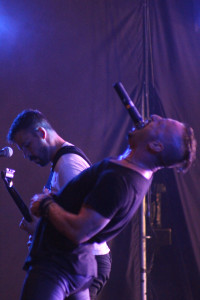
The Dillinger Escape Plan were such a case in point – taking industrial metal and rock to extremes, both sonically and physically, as guitarist Ben Weinman leapt gymnastically from his amplifier stack while singer Greg Puciato fallaciously sucked his microphone. As entertainment goes, the New Jersey hardcore punk group were a highlight of the entire three days.
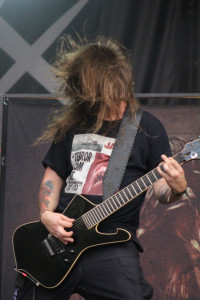
In a similar vein, Polish Death Metal act Decapitated, led by guitarist Wacław ‘Vogg’ Kiełtyka, simply powered their way through their set on the Forest Stage, somewhat incongruously named for such a doom-laden experience.
More appropriate for the leafy setting was Mick Harvey, Bad Seeds guitarist, who performed his renditions of classic Serge Gainsbourg songs accompanied by vocalist Xanthe Waite. The bongo-playing Australian may be a fine guitarist, but vocally and visually he is a disappointing front-man, with only tunes such as ‘Ford Mustang’, ‘Harley Davidson’ and ‘Overseas Telegram’ stand-out highpoints.
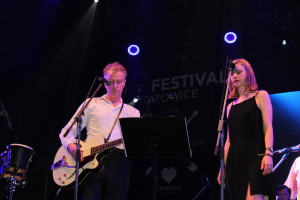
Xiu Xiu had rather more success (and audience reaction) with their interpretation of the David Lynch cult classic Twin Peaks soundtrack; joyously bizarre and off the wall as it should have been.
Over on the Trójka Stage, Mark Kozelek’s Sun Kil Moon were garnering large cheers for their alternative indie-rock, although personally Kozelek’s arrogant posturing left me a bit cold, (as did a lyrical reference of his girlfriend gesticulating “so you think you’re Mick Jagger” to a melody that sounded rather too akin to ‘Undercover of the Night’)
Denied by officious security to take pictures of UK rapper Future Brown, (who seemed to spend his time complaining about the heat) I headed for the tranquillity of the food court and a rickety beer crate to sit on. For the majority, the menu on offer was superb, and with low prices on almost everything (beer works out at roughly £1.50 a pint, meals less than a fiver and good portions, too) there was much to recommend. Fish and Chips from the Big Red Bus was as delicious as seaside fare, as was the bagel devoured near the main stage, overflowing with fresh ingredients and bursting with taste and flavour. French Fries were, well, French Fries and the only disappointing item was the Silesian Hotdog, a curious sausage fed through a hollowed out baguette.
At this point, I should mention the ‘tunes’ of Sunn 0))), not so much music, more an assault on the very notion of harmonious composition and congenial experiences. I openly wondered at the time whether composer Stephen O’Malley was actually just taking the mickey and that the joke was on us, the audience; at the end of the set, having performed an hour of utterly unlistenable drone metal that was neither pleasurable nor interesting, he would hold up his hands and say ‘hey, sorry, I was just having a laugh and you all fell for it.’ Sadly, I feel O’Malley is deadly serious, although I remain convinced that there is a case of ‘The Emperor’s New Clothes’ about the whole affair.
A leading Polish music critic and commentator told me, “it is the Devil’s music.” I think Lucifer needs to tune his guitar and write some proper songs. As I lay awake in the heat of the Polish summer, listening to the low moan of the refrigerator, I found myself thinking it was more tuneful than the songs of Sunn 0))).
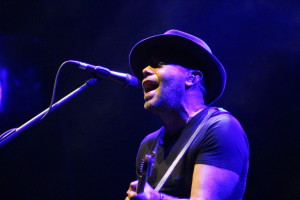
Reformed Oxford shoegazers Ride, presumably having put their musical differences aside, were in commanding form on the main stage, although formerly floppy-haired guitarist Mark Gardner was almost unrecognisable in a broad Trilby hat and stubble while Andy Bell seemed to have opted for the crazy shirt and a couple of day’s beard growth. Still, good songs (and good bands) always stand the test of time and after a few away from the limelight Ride took every opportunity to display what the indie world had been missing.
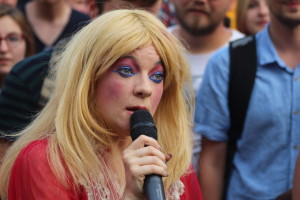
Sunday was hot. Very hot. The hose-pipes were out and people were heading for the limited sanctuary of shade within the trees to the side of the main stage. Meanwhile, tempers were fraying in the Experimental Tent as Ann Liv Young took to the stage. Allegedly a performer, choreographer and dancer, the US singer’s song fell flat and was greeted with silence from an otherwise bemused crowd. At this point Young began demanding why no-one reacted to her singing, followed by a racially motivated diatribe, (that I assume, thankfully, was lost in translation amongst the Polish-speaking audience) before launching a blistering attack upon a young couple caught kissing. So frightened were they by Young’s verbal assault the couple fled only to be pursued into the open air by the American performer, intent on harassing whoever stepped into her path. Performance art, deliberate provocation or a cleverly thought-out act? Who knows? It may not have been the most pleasurable experience but then again, my friends and I couldn’t stop talking about it.
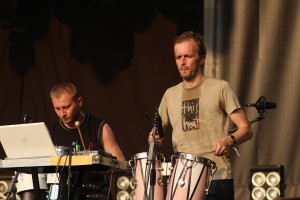
Innercity Ensemble were an altogether more calming encounter, although, in the hottest part of the day, the rhythmic collective of improvisational musicians looked genuinely sweltering in the oppressive atmosphere. In the cooler Forest Stage, Atlanta-based Algiers profess to be “early 70s Motown, the proto-punk fury of the MC5, the synth primitivism of Suicide, [and] the biblically charged drama of the Bad Seeds.” Personally, I thought they sounded like Roachford.
Although OFF to that point had certainly been one of the better festivals for its vibe, ambience and overall good feeling, the music hadn’t been the best. Variety for variety’s sake doesn’t always work, and my friends who had been regular visitors to the festival over the years were already expressing disappointment with the line-up, particularly the over-reliance on Metal and Rap. What also struck me was the similarity of stage size; there was no hidden gem, such as the Walled Garden featured at Green Man, where a small, on-the-way-up band could be discovered, followed and dates in diaries filled with future gigs at different venues. The Literary Café was also too small, only catering for roughly 100 people. Given an estimated crowd of 15,000 daily this seems such a small percentage given the popularity confirmed by the lengthy queues.
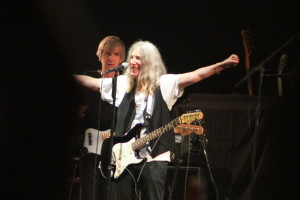
It was up to Patti Smith to save the day, with the promise of a full performance of her seminal album Horses. And deliver she did. To say Patti Smith was head and shoulders above any act at OFF is an understatement. But then, Patti Smith is simply head and shoulders above most acts in the world and has been for a generation, in my opinion. With such an uncomplicated line-up – guitar, bass, drums and keys (including original band members Lenny Kaye on guitar and drummer Jay Dee Daugherty) – this was still one of the most dramatic, exhilarating, breathtaking, spine-tingling gigs I have ever witnessed. The power in Smith’s performance is hard to illustrate on a page; you truly had to be there. A hair-on-the-back-of-the-neck passionate plea for a moment’s silence and an apology to remember the victims of the atomic bombs dropped on Japan was followed by a rendition of her tribute to Jimi Hendrix, ‘Elegie’, with Smith reading out names of departed loved ones, including Joe Strummer, The Ramones, Sid Vicious, husband Fred “Sonic” Smith, Robert Mapplethorpe and Lou Reed.
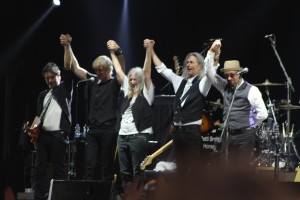
‘People Have The Power’ seemed to be Smith’s message, followed by the most explosive version of ‘My Generation’, (“hope I die before I get old” thankfully replaced by something more appropriate but ridden with expletives) before Smith shreds her guitar strings, kisses the neck and proclaims that “we don’t need bombs, this (the guitar) is the only weapon we need!”
Check out GIITTV’s 10 Best European Festivals 2015.
Photo credit: Charlie Darling

